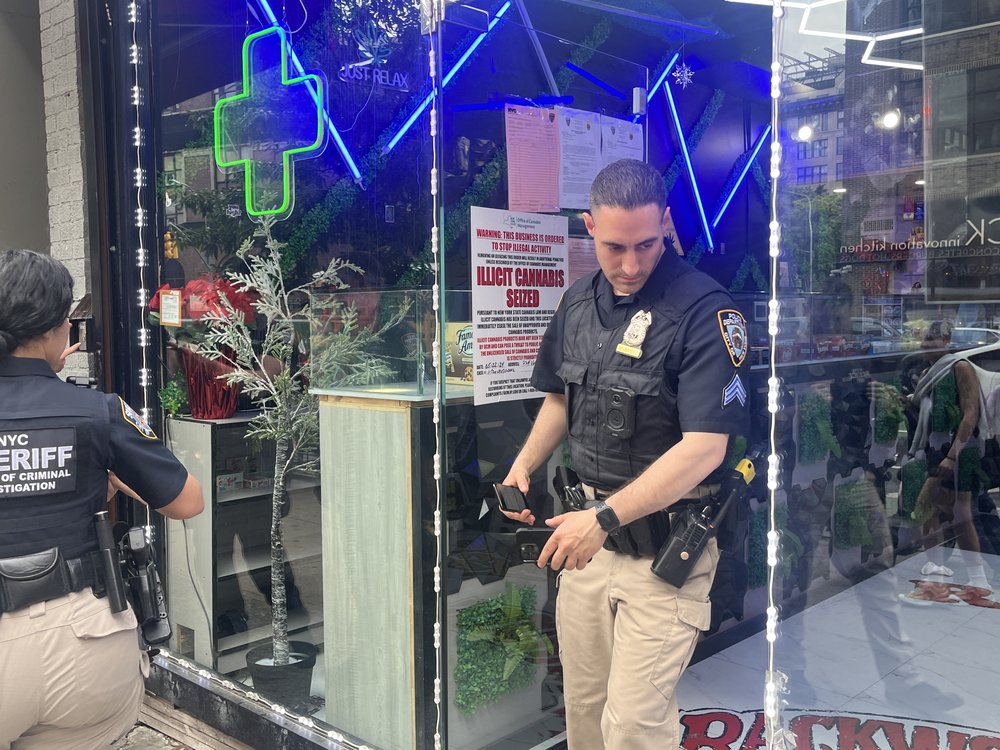NYC law used to shutter unlicensed weed bodegas is unconstitutional, judge rules
Oct. 29, 2024, 1:57 p.m.
The decision calls into question the legality of the closures and the city’s enforcement efforts.

A Queens judge ruled Tuesday that the local law that let New York City rapidly shut down more than 1,000 businesses accused of selling cannabis without licenses is unconstitutional because it denies shop owners their rights to due process.
The decision calls the legality of the closures into question and has the potential to halt the city’s enforcement effort, known as Operation Padlock to Protect, which Mayor Eric Adams has repeatedly hailed as a success.
Liz Garcia, a spokesperson for the mayor, said Tuesday the city will appeal the ruling.
"Illegal smoke shops and their dangerous products endanger young New Yorkers and our quality of life, and we continue to padlock illicit storefronts and protect communities from the health and safety dangers posed by illegal operators,” she said.
The city updated its administrative code earlier this year to make it easier to shut down stores suspected of selling cannabis without licenses. But New York Supreme Court Justice Kevin Kerrigan has ruled that the portions of the city's law that allow the sheriff to unilaterally decide whether to keep a store closed for up to a year are unconstitutional.
Under the law, the owner of a business that has been padlocked for allegedly selling cannabis without a license is entitled to a hearing with the Office of Administrative Trials and Hearings, or OATH. After listening to the facts of the case, the hearing officer makes a recommendation as to whether the store should remain closed.
But the ultimate decision is up to the sheriff — and lawyers representing businesses that have been shut down say it’s not uncommon for the sheriff to ignore OATH’s recommendations.
That’s what happened in the case Kerrigan ruled on Tuesday. The lawsuit was brought against the city by the owner of a store called Cloud Corner — incorporated as ASA 456 Corp. — on Francis Lewis Boulevard in Queens. Cloud Corner was shut down over accusations of selling marijuana without a license in early September.
At the OATH hearing on the case that took place a few days later, the city submitted photos of cannabis products that it said were for sale at the store, according to documents filed in the lawsuit. A Cloud Corner employee confirmed at the hearing that the products were for sale, but testified that the officers conducting the inspection had visited the store while it was closed, according to the court filings.
The OATH officer recommended that the sheriff reopen the store because cannabis products were not being sold or marketed at the time of the inspection, court filings show. But the sheriff overruled that decision.
“lf the final arbiter has the authority to confer no weight to the hearing, there is no real meaningful opportunity to be heard, which … raises a due process concern,” Kerrigan wrote in his decision on the case.
Kerrigan determined that the sheriff must allow Cloud Corner to reopen.
Lance Lazzaro, an attorney who filed the case on Cloud Corner's behalf, said he is optimistic the ruling will be upheld by a higher court.
“I don't see an appellate court saying that due process is served when the sheriff acts as the judge and jury and executioner,” Lazzaro said.
Lazzaro also filed a separate class-action lawsuit against the city in June challenging the law's constitutionality on behalf of a group of 27 businesses that were shut down through Operation Padlock.
He said if Kerrigan’s decision is upheld, it potentially opens the city up to “a flood of lawsuits for loss of business and loss of reputation,” by stores that have wrongfully been shut down.
This article was updated with additional comment from the Adams administration.
NYC cracked down on illegal weed bodegas, left behind hundreds of shuttered storefronts As NYC cannabis enforcement ramps up, sheriff's office ushers in largest class of deputies Lawsuit aims to stop NYC's mass crackdown on marijuana shops, says it's unconstitutional Crackdown on illegal weed shops expands, as Manhattan DA asks landlords to evict violators